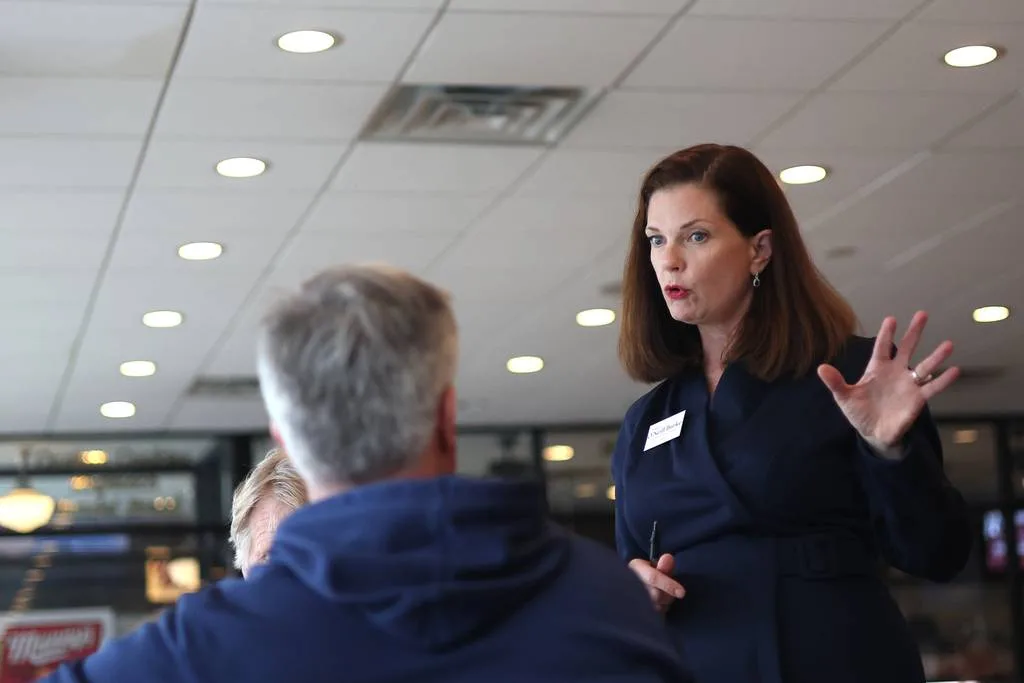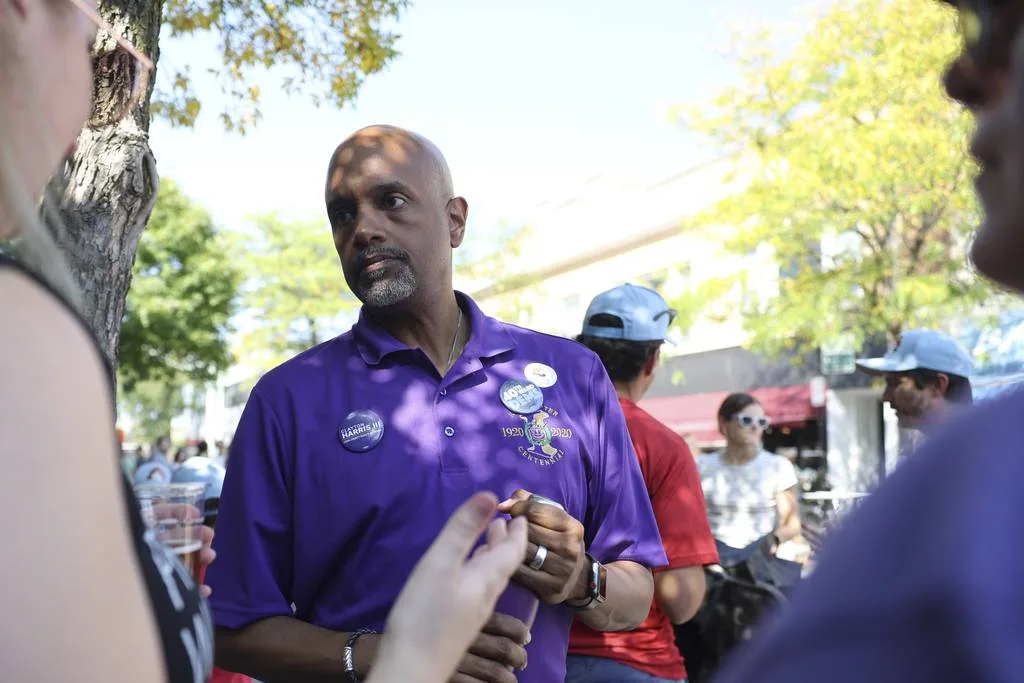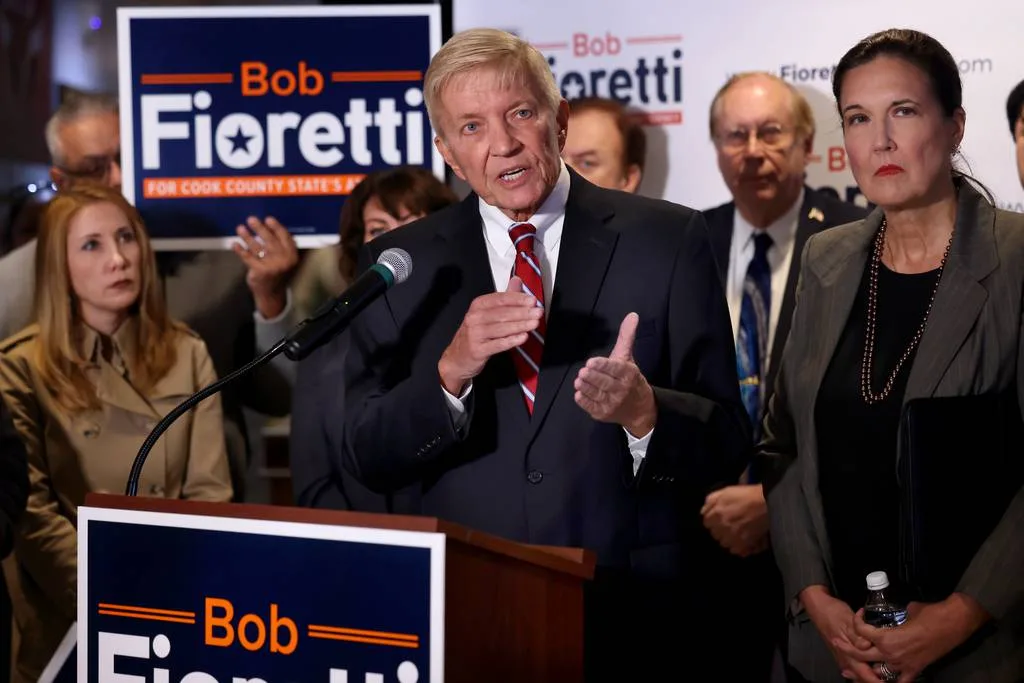Of all the names that might be on the ballot next year running for Cook County state’s attorney, one that will assuredly not be is Kim Foxx.
Yet the political shadow of the outgoing state’s attorney will loom large over the March primary election as potential successors will be measured up against Foxx’s roles as both an unabashed leader in the national progressive prosecution movement and a frequent focus of barbs about Chicago crime.
So far, three candidates have announced campaigns to replace Foxx, though that list might grow throughout the next week as hopefuls must begin turning in petitions to be placed on the ballot.
There’s no doubt Foxx’s policies during her two terms in office — unwinding wrongful convictions, emphasizing mitigation and rehabilitation rather than high conviction rates alone, a shift from prosecuting lower-level and nonviolent crimes, and staunch support of the statewide elimination of cash bail — will become major issues on the trail.
Though one has received backing from Foxx mentor Cook County President Toni Preckwinkle, both Democrats in the race began their legal careers in the state’s attorney’s office and are campaigning for a more “balanced” approach to prosecutions and progressivism. Still, both also say they will keep in place many of Foxx’s policies, such as community courts and first-time offender diversion.
While neither is seeking the endorsement of the Fraternal Order of Police, both Democrats have spoken about resetting relations with the Chicago Police Department as well as the need to boost morale in the office after months of attrition.
The two tout different strengths.
After spending nearly her entire career in and around the courtroom as a prosecutor, criminal defense attorney and judge, Eileen O’Neill Burke argues her breadth of experience makes her the right fit to oversee an office of more than 1,400.
Clayton Harris III, who is backed by Preckwinkle and the Cook County Democratic Party, argues his management skills from multiple stints across Illinois government and his time in policing policy and in academia make him the best choice.
The race also has attracted one declared Republican, former Chicago alderman and attorney Bob Fioretti, who has described Foxx’s tenure as a “disaster” that turned the office “into a social service agency instead of the prosecuting arm of the people.”

Of the two Democrats running for the office, O’Neill Burke puts a stronger emphasis on getting “violent crime under control.”
Raised in a family of cops — her father, grandfather and great-grandfather were police officers — O’Neill Burke said in a late September interview she knew when pursuing her degree at the Chicago-Kent College of Law that she wanted to focus on criminal law. It’s there she met her husband, attorney John Burke, now a partner at Ice Miller.
O’Neill Burke joined the state’s attorney’s office in 1991 and stayed for a decade. She handled heavier juvenile cases and took them through investigation, trial and sentencing, also working in appeals and felony review. After having twins, her third and fourth children, she moved to criminal defense and eventually started her own practice. The change, she said, helped balance her viewpoints and better inform her decision-making as a judge.
In 2008, she ran for a judicial position in Cook County Circuit Court and handled an array of assignments, bouncing from civil court to criminal court, preliminary hearings and the law division. In 2016, she ran unopposed for the state’s 1st District Appellate Court in Cook County, where she remained until stepping down this summer.
A “big believer” in the recently passed but controversial SAFE-T Act reforms to bail practices, O’Neill Burke said she would plan to ask for detention and jail time in cases where defendants — including first-time offenders — were in possession of automatic weapons or guns with an extended magazine or bump stock.
For accused juveniles, she said she would move to mandate after-school activities such as job training or trade school so they “are busy until 10 o’clock at night.”
She said she would request detention for those charged with armed robberies, carjackings or violent crimes on the CTA.
“I have four children. My heart’s in my throat every time they’re taking the CTA. That’s not right,” she said.
She also signaled she would end Foxx’s early policy not to prosecute certain shoplifting offenses as felonies unless the value of the stolen goods is over $1,000. “It’s not appropriate to say we’re not going to enforce the law as it is written,” she said. “The deterrence for crime is not the severity of punishment. It’s the certainty of a consequence. People have to be held accountable.”
O’Neill Burke also pledged to bring a twofold approach to the office: a felony prosecution bureau “for the hard chargers who want to be trial attorneys” and a restorative justice bureau that would handle nonviolent cases such as juvenile, drug and mental health-related cases, with a focus on “actually getting people back on track.”
This approach, she said, would be key to attracting a range of attorneys who want to chart careers as public defenders, in public interest advocacy law or in trial law.
The office struggled with prosecutor churn after the pandemic, though numbers have improved. As of mid-October, the office had 90 vacant assistant state’s attorney positions out of a budgeted 797.
What’s pushing that attrition? O’Neill says overwork from too-heavy caseloads and smaller teams working each case, a sentiment Foxx has agreed with.
During her October budget hearing, Foxx noted she requested fewer attorneys — 783 — and shifted funding to hire more paralegals and administrative staff members to ease the burden of paperwork and data entry. Through Nov. 1, criminal and special prosecutors had the highest caseload: 334 per attorney, according to Foxx’s office, while civil attorneys each had 101 new cases this year and juvenile attorneys had 76.
Of Foxx’s national status, O’Neill Burke said she planned to be the opposite: “Kim became very much an icon. She has a beautiful back story. She is an articulate speaker and she became a nationwide icon. I’m not gonna be an icon.”
“Government is supposed to keep our citizens safe. And we’re not doing that now. If we can get our crime rates down, and people want to pay attention, that’s great,” O’Neill Burke said. “I’m gonna be quietly competent in this office. That’s where I want to go with it.”




A military brat, Clayton Harris III initially studied aerospace technology at Middle Tennessee State University. His early resume included a stint at the Pentagon working on ballistic missile defense before pursuing a law degree at Howard University.
His initial goal was to become a lawyer helping adjudicate international outer space disputes. He ended up much closer to the ground. In 1998, between his second and third year of law school, he interned as a clerk at the state’s attorney’s office, and then became an assistant state’s attorney in 1999. He stayed with the office for less than four years, but during that time worked on criminal appeals, traffic, preliminary hearings and narcotics special prosecutions.
The same reason he left is the one that brings him back, he said: “It was taxing to just see Black men coming through the system constantly. Period. Just Black men.”
“One day I was standing in arraignments at 26th Street, and the defendant was Clayton Harris. I mean, it was just surreal,” he said.
In another incident, a police officer was asked to identify a suspect during trial.
“He never turned, he just says, ‘Yeah, the African American male to my left, standing about 6 feet tall. He’s about 180 pounds. Baldheaded with a goatee.’ And I was like, ‘Well, you just described me.’ And he looked at me and said, ‘Oh, and IDOC jumpsuit,’” Harris recalled. “It just stirred something in me.”
When given an opportunity to work in intergovernmental affairs in Mayor Richard M. Daley’s office in 2003, Harris took it. He organized for more stringent assault weapons laws and better criminal sexual assault laws before becoming general counsel at the Chicago Department of Transportation in 2005. He then became chief of staff at the Illinois Department of Transportation, where he oversaw the 2006 reconstruction of the Dan Ryan Expressway, at the time the biggest road rehab in Chicago’s history.
From there, Harris became deputy chief of staff for infrastructure in Gov. Rod Blagojevich’s administration, “right before the collapse.”
The day Blagojevich and his chief of staff, John Harris (no relation), were arrested, Harris recalled getting a strange text message on his way into work at the Thompson Center that morning, “Is it true?” And then he got an odd look from a state trooper in the building. Federal agents had swarmed the governor’s offices. Harris recalls gathering employees in a conference room, setting up workstations and asking at least one person to stop crying.
“I was like, ‘You weren’t arrested. You haven’t done anything wrong. You’ve got to do your job.’ That’s how I became chief of staff,” he recalls. The “chaos” continued, however, including an incident in which he said he was directed by Blagojevich to fire the entire legal department. He didn’t.
Harris doesn’t highlight his work for Blagojevich on campaign materials.
“That omission is because people will take it and run with it under a very specific narrative,” Harris said, adding he was not close to the former governor, never contributed to his campaign funds and didn’t work on his political campaigns.
“Really, my role was keeping the state operating,” he said.
After Gov. Pat Quinn cleaned house of Blagojevich-affiliated officials at the state, Harris went to work in intergovernmental affairs at the construction firm CH2M Hill, later was the executive director of the Illinois International Port District and then moved to ride-share company Lyft, where he worked for two years in intergovernmental relations.
That work included increasing access to rides in “disenfranchised communities” and launching discussions about getting partial benefits for independent contractors, he said.
Harris also began lecturing at the University of Chicago in 2009, teaching “Process and Policy in City and State Government” and “Policing in America: Black, White and Blue.”
Harris said he would continue Foxx’s programs to divert first-time and nonviolent offenders, and also keep community courts. But he also would seek to regularly highlight special prosecutions of organized crime, gun offenses and carjackings, he said.
“I think it’s important to tell our story so that people know that their state’s attorney is ensuring that they are safe,” he said. “My platform is very simple: safety and justice. But safety doesn’t necessarily mean just going out and arresting everyone and certainly doesn’t mean everyone goes to jail because they’ve been arrested. So it is holding everyone accountable, but it’s how we hold them accountable.”
He’d also work to bridge “gaps” in the relationship between the office and law enforcement.
He said he has already met with the FOP to discuss changing the narrative “that the state’s attorney is not prosecuting the cases that the police are bringing forward.”




Bob Fioretti faces an uphill battle. Not only have voters rejected his candidacies for mayor of Chicago, Cook County Board president and state’s attorney since he left the City Council in 2015, no Republican has won the race since Jack O’Malley in 1992, and no Republicans currently hold countywide office.
Fioretti is a graduate of the Northern Illinois University College of Law and a partner at the firm Roth Fioretti, where he has focused on civil litigation.
Even so, Fioretti, a former Democrat and founding member of the City Council’s progressive caucus, said he believes persistent worries about crime and its impact on the city’s reputation as a business and tourism hub will win over voters from both parties.
“To the experienced prosecutors who have left in frustration, come back. I will extend an offer to reinstate you at the same grade and level as if you had never left,” he said at his campaign launch earlier this month. “To the police officers out there, I’ve got your back.”
He sees no difference between Foxx and the two Democratic candidates.
“They want to keep the same system and they have nothing to offer,” he said.
It’s unclear whether Fioretti will be the only name on Republican primary ballots.
Former state lawmaker Jim Durkin, who led the Republican minority in the Illinois House for nearly a decade before stepping down in January, has said he is still mulling a bid.


